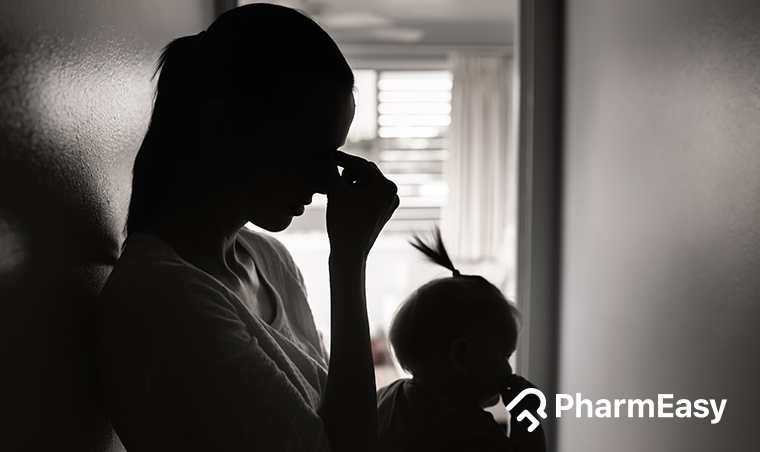Postpartum Depression – Signs, Symptoms And Treatment
By Nishkak +2 more

Get more insightful and
helpful tips to
treat Diabetes for FREE



Download PharmEasy App




Register to Avail the Offer
Send OTPBy continuing, you agree with our Privacy Policy and Terms and Conditions
By Nishkak +2 more
Table of Contents
Postpartum depression is a type of depression that occurs in some women who have given birth recently and affects them physically, emotionally and behaviourally. Typically, this kind of depression begins within 2- 4 weeks after giving birth.

Postpartum depression symptoms include a broad spectrum of changes that a mother endures. It is important to note that the condition doesn’t happen to all women after pregnancy.
After giving birth, about 1 in 10 women experience some form of depressive psychological change. In extreme cases, postpartum psychosis may also occur in 1 out of every 1000 women.
The most common signs of postpartum depression are easily missed. These are associated with giving birth and may initially not indicate any serious mental health issues:
Along with the above general postpartum symptoms, major clinical depression after giving birth may also be associated with the following:
Note that, as per most psychological/psychiatric institutions, postpartum depression is a real, serious medical condition. Although it may not affect everyone, it is still common enough that it should be talked about often.
Panic disorder, obsessive-compulsive disorder and other conditions may also occur simultaneously.
There aren’t any confirmed causes of postpartum depression. We do know that it is most probably related to the extreme hormonal changes in the woman’s body during this time. For example, oestrogen, the female hormone associated with reproduction, is ten times higher during pregnancy. But within 3 days of giving birth, this number drops to pre-pregnancy levels.
This is a rapid hormonal change and it is linked to this postpartum depression, but the exact processes are not understood. Other factors that contribute to this condition include lack of sleep, anxiety over the newborn baby and its care as well as psychological factors like loss of self-image, self-identity, a sense of not being in control or even a perceived loss of attractiveness.
Apart from these potential symptoms, certain risk factors play a role in postpartum depression:
Postpartum care will vary depending on how serious your symptoms are. There are several options available to help you, your baby and your family get through this time. Medications can be one part of your treatment. Additional help will be in the form of psychotherapy/counselling as well as participation in support groups.
Even if you are breastfeeding, you may still be able to take your depression medication prescribed by your doctor. Speak with your doctor and decide with them.
Also Read: Pregnancy Fatigue: Unraveling Causes and Research-Backed Solutions
Giving birth can be one of the most joyous occasions in your life. But it is important to be prepared for the good and the bad. Postpartum depression isn’t likely to affect many women, but the ‘baby blues’ as it’s called can affect as many as 70% of women. In the days following your pregnancy, be sure to monitor your mental health and get as much sleep as you need. Speak with your partner, family members, social support and doctor in case you feel you may be experiencing signs of postpartum depression. Consult a psychiatrist without delay if you notice any symptoms of postpartum depression.
Disclaimer: The information provided here is for educational/awareness purposes only and is not intended to be a substitute for medical treatment by a healthcare professional and should not be relied upon to diagnose or treat any medical condition. The reader should consult a registered medical practitioner to determine the appropriateness of the information and before consuming any medication. PharmEasy does not provide any guarantee or warranty (express or implied) regarding the accuracy, adequacy, completeness, legality, reliability or usefulness of the information; and disclaims any liability arising thereof.
Links and product recommendations in the information provided here are advertisements of third-party products available on the website. PharmEasy does not make any representation on the accuracy or suitability of such products/services. Advertisements do not influence the editorial decisions or content. The information in this blog is subject to change without notice. The authors and administrators reserve the right to modify, add, or remove content without notification. It is your responsibility to review this disclaimer regularly for any changes.
Comments